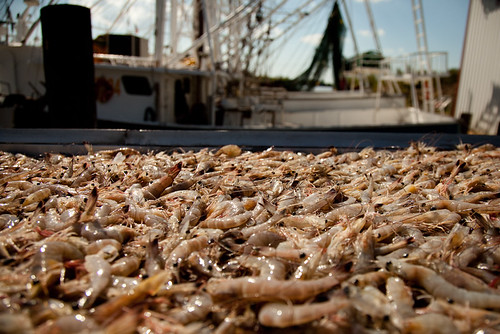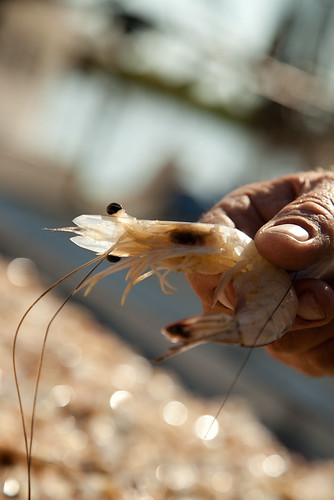Warning Signs Flash at the Start of a Crucial Shrimp Season in the Gulf
The first week of Louisiana’s crucial brown shrimp season is nearly over and the reports from fishermen are not good. A government source confirms catches are down dramatically and some fishermen say they have given up because the price of gas is high and the price they’re getting for Gulf shrimp is low.
“It’s the worst I’ve ever seen for a shrimp season open,” says Acy Cooper, a Venice-based shrimper and vp of the Louisiana Shrimp Association. “The brownies we are getting are very small and there’s not too many of them. People around here can’t make a living with the price of shrimp these days and the high prices of gas. It’s going to get bad around here if we can’t catch more shrimp.”
Things already are bad enough after fishermen here got walloped by the worst oil disaster in history. Now the Mississippi River flood is bearing down on the state. But when the brown shrimp season opened, everyone was hoping this would be a major boost to everyone’s fortunes and spirits. Government scientists and some fishing experts were sending positive messages that the fisheries have not been hit as hard by the oil as once feared. Now fishermen are starting to wonder if the impact of the BP oil spill is worse than everyone suspected.
“We know a lot of shrimpers who have just quit because they can’t make it right now,” says Karen Hopkins of Dean Blanchard Seafood, the largest shrimp buyer in the state. “Barataria Bay is just dead. We’re trying to get Wildlife and Fisheries to close the season down because we don’t want to kill the entire crop of babies.”

Gulf shrimp unloaded last year in Venice, LA Photo: Lisa Whiteman/NRDC
According to Hopkins, it’s not just shrimp that are being impacted. They have seen a decline in many species of fish this year. But people were optimistic that the brown shrimp season would get off to a good start after state experts said initial testing proved positive. “It’s not the kind of season they predicted it would be from testing they did before the season opened,” says Clint Guidry, Louisiana Shrimp Association President. “We’re just not seeing it.”
To some, this can’t be blamed on the historic flood now threatening the Mississippi delta. Guidry says high fresh water from the Mississippi River has not affected parts of Barataria Bay, one the productive fishing grounds on the Gulf Coast. It’s also one of the most polluted after toxic tides of oil rolled in last summer. "It’s still early in the season, but it’s not hard to explain,” Guidry says. “BP did it. Whether we’ll ever be able to absolutely prove it is another thing.”
If the shrimp season continues to worsen, it could be an economic death knell for fishermen barely hanging on after this disaster. Many spent what money they made off the BP cleanup on repairing their boats and getting ready for the season, which lasts through the summer and sustains most fishermen through the rest of the year.
“Unlike the oil companies, we don’t have tax breaks,” Guidry says. “We took the money we made and put it into fixing our boats and then had to pay taxes. And a lot of people still haven’t gotten compensation from BP in the first place.”
Fisherman and shrimper David Arnesen is worried about the long term impacts. If brown shrimp have been hurt by the oil disaster, then that spells serious problems for the rest of the fishing industry—and for the health of the gulf.
“I’ve never seen an open like this one,” Arnesen says. “They can’t blame it on high water because some areas don’t get fresh water here. Shrimp are a major food source in the food chain. It may take years to see the full impacts. But it don’t matter which end you hurt. It’s all connected from the top to the bottom. If the shrimp are in trouble, we’re all in trouble.”

Louisiana Gulf shrimp Photo: Lisa Whiteman/NRDC
A week into the brown shrimp season it’s hard to say what this means for fishermen in the Gulf. Some say they have little choice but to keep getting in their boats and hope things improve. "We’re going to keep fighting because that what we do down here,” Acy Cooper says. “Sometimes it’s not too pretty, but you gotta do what you gotta do.”
When the BP well was plugged last summer, fishermen hoped this year things would be different, that the fish and shrimp would return and business would soon get back to normal. But if this week’s brown shrimp catch is any indication, that rosy scenario appears unlikely. Instead, it could be the beginning of a long and difficult fight, a struggle for a fishing community’s survival. And with it the healthy ecosystem of the Gulf.
